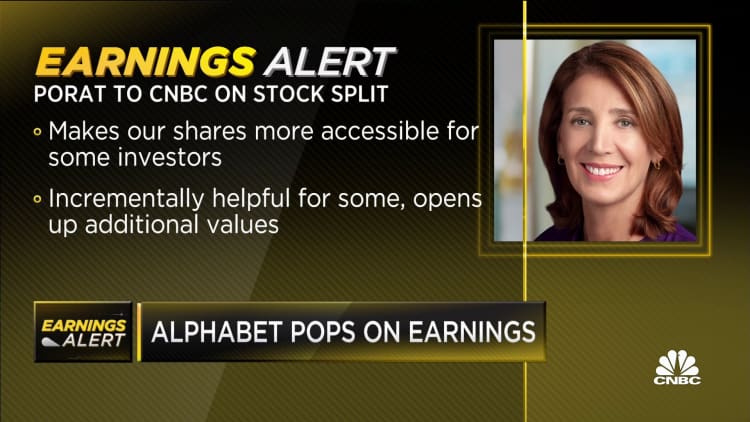
Google parent Alphabet said its board approved plans for a 20-for-1 stock split on Tuesday as part of the technology company's quarterly earnings statement. Alphabet stock rose more than 9% in after-market trading following the news.
The move comes a year and a half after Apple most recently split its stock, giving three shares for each share that people owned. Alphabet and Apple are among the few technology companies that have seen their market capitalizations stretch into the trillions, as investors opted for profitable growth.
Alphabet intends to split the Class A, Class B and Class C shares of the stock, according to the earnings statement. The change requires shareholder approval. Each shareholder at the close of business on July 1 will receive, on July 15, 19 additional shares for each share of the same class of stock they own.
In 2012, Google added a third class of shares, Class C, with no voting rights. The company already had Class A shares, which carry one vote per share, and Class B shares, which are held closely by founders and early investors and carry 10 votes. The company maintained this stock structure through its 2015 rebrand to Alphabet.
In a letter included the 2004 prospectus for Google's initial public offering, Larry Page and Sergey Brin, Google's founders, emphasized that they would always act "with the long-term welfare of our company and shareholders in mind."
They described the introduction of the third class as "effectively a stock split" in a 2012 letter and said it was something many shareholders had been clamoring for. The 2-for-1 stock split came in 2014, before the switch to Alphabet.
Page and Brin own a combined 12% of Alphabet's Class C shares, which trade under the ticker symbol "GOOG" and have no voting rights, according to FactSet. The duo control 83% of the company's Class B shares, which do not trade on open markets.
Shares of Alphabet stock have become more expensive lately, at over $2,750 each at the time of market close on Tuesday, having doubled in price since May 2020. The lower price would mean that more investors might be able to afford buying entire, rather than fractional, shares of the advertising company.
Were the split to happen as of Tuesday's close, the cost of each share would go from $2,752.88 to $137.64, and each existing holder would get 19 additional shares for every one they own.
-- CNBC's Ari Levy contributed to this report.


